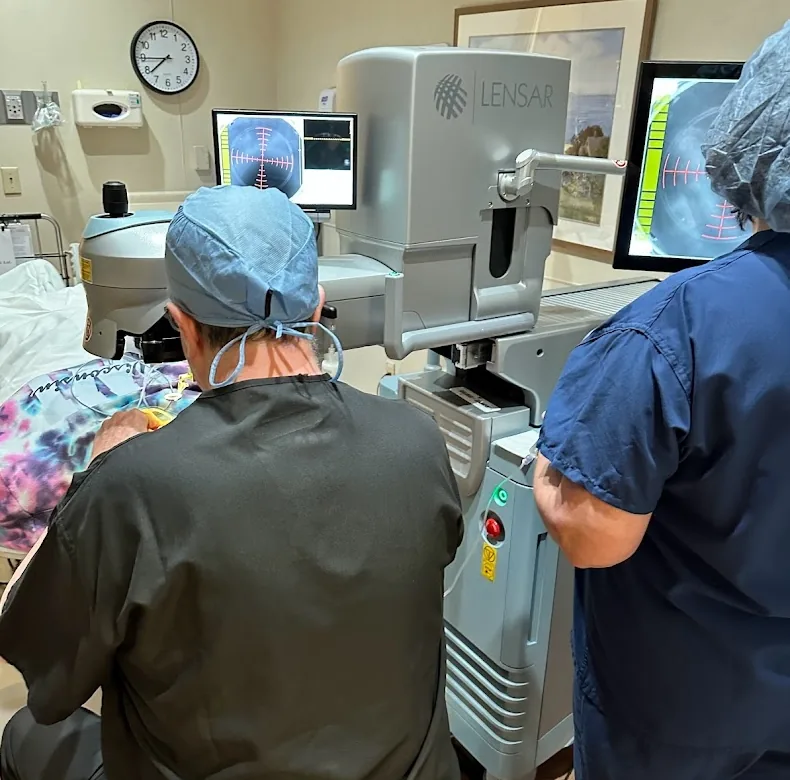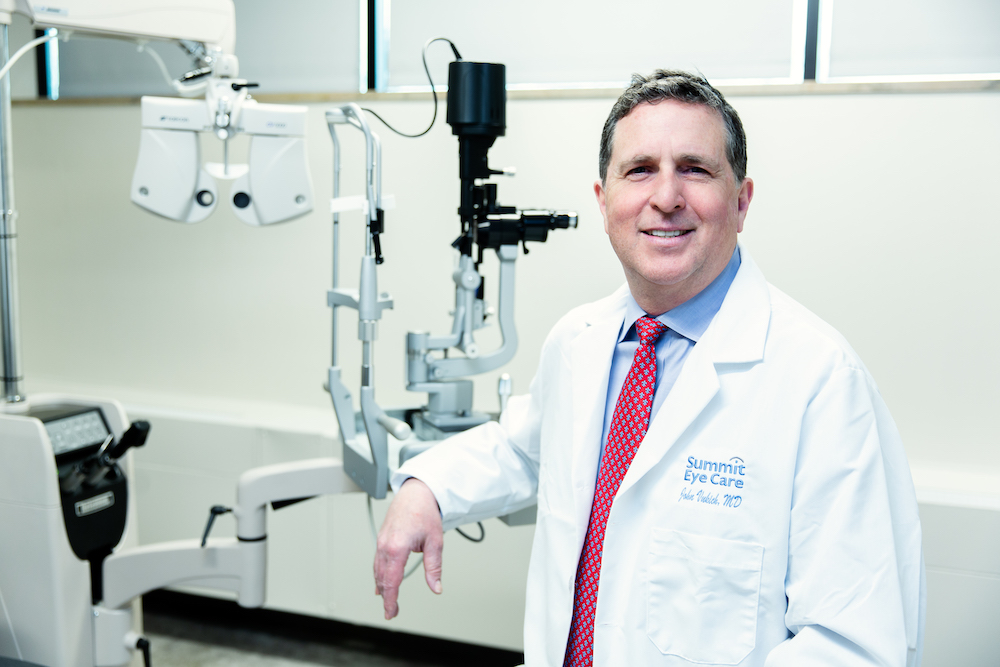Last updated: June 24th, 2024
At Summit Eye Care, we combine the latest advancements in laser cataract surgery with a patient-centric approach, ensuring both comfort and confidence throughout the treatment journey. Our commitment to integrating advanced technology with compassionate care sets us apart as a leading choice for cataract surgery in the Milwaukee, WI area.
What are Cataracts?
As we near middle age, proteins in the lens of the eye begin to form clumps, causing areas of clouding (opacification), which we know as cataracts. When a lens is clouded by cataracts, less light passes through the lens to the retina and this can cause a number of vision problems.1
Symptoms of Cataracts
Symptoms of cataracts include:
- Cloudy vision
- Blurry vision
- Colors that appear dulled
- Difficulty seeing at night
- Halos and glares around bright lights
- Double vision
- Sensitivity to light2
Laser Cataract Surgery vs Traditional Cataract Surgery
During traditional cataract surgery, a handheld instrument is used to break up the cloudy natural lens of the eye and remove it before an artificial lens is placed. While this method is effective, laser technology allows us to optimize our patients’ experience and outcomes. When compared to manual cataract surgery, laser-assisted cataract surgery offers improved efficiency and precision.
Laser cataract surgery benefits include:
- Superior Vision Correction: Utilizing the femtosecond laser, our ophthalmologists can meticulously adjust the cornea’s shape. This precision helps reduce refractive errors including astigmatism and significantly improves vision quality.
- Unmatched Precision: Laser technology replaces the need for manual corneal incisions, allowing our surgeons enhanced control and accuracy during the procedure.
- Optimal IOL Placement: The laser-assisted approach ensures precise openings for IOL implantation, leading to more predictable and successful outcomes.
- Efficient Lens Removal: Our advanced laser technique breaks down the natural lens into smaller pieces (fragmentation) and softens it (phacoemulsification), simplifying and speeding up cataract removal.
Quicker Recovery Times: The minimally invasive nature of laser surgery at Summit Eye Care reduces postoperative swelling, facilitating a faster return to clear vision for our patients.

Laser Cataract Surgery Technology
At Summit Eye Care, we remain at the forefront of eye surgery by employing state-of-the-art laser technology for cataract surgery.
LENSAR® Laser System with ALLY® Technology
We employ the LENSAR femtosecond laser, a device specifically engineered for cataract surgery to deliver enhanced precision, faster removal of the eye’s clouded lens, and superior accuracy when placing IOLs. Our LENSAR system has been upgraded with ALLY® software to increase efficiency, so our patients spend less time at our surgery center on the day of their cataract surgery.

Astigmatism Correction with LENSAR Laser Technology
The LENSAR femtosecond laser is used to treat astigmatism through precise limbal relaxing surgery. Astigmatism results from an irregular curve in the cornea, which can affect vision at all ranges. Using the LENSAR laser, our surgeons can relax the limbus connecting the cornea to the white part of the eye (the sclera) in a procedure called astigmatic keratotomy. This allows the cornea to adopt a rounder shape, and can improve vision in patients with low to moderate astigmatism.
Interested in Astigmatism Correction? Watch our Video on Femtosecond Laser Assisted Cataract Surgery to Learn More.
Preparing for Laser Cataract Surgery
The key to feeling well-prepared for your cataract surgery is to attend a consultation with Dr. Vukich. During this appointment, Dr. Vukich will conduct an eye exam and help you understand cataracts as a condition and explore your treatment options, including the wide range of IOL options available to you. Once your cataract surgery has been scheduled, you will receive detailed instructions for the days leading up to the procedure, surgery day, and the recovery period. Your follow-up visit will also be scheduled at this time.
How Laser Cataract Surgery Works
Laser cataract surgery takes less than 20 minutes and is an outpatient procedure. To ensure your comfort, you will be offered an oral sedative and your eyes will be numbed with anesthetic eye drops. Your eye surgeon will use a femtosecond laser to make a small incision in your eye, then break up the cloudy lens and remove it. Using advanced laser technology, your new IOL will be precisely placed between the colored part of your eye (the iris) and the pupil. Once the laser cataract surgery procedure is complete, a protective shield will be taped over your eye. You will recover briefly here before being driven home by a friend or family member.

Recovery After Laser Cataract Surgery
Recovery after laser cataract surgery is brief: most of our patients feel comfortable returning to work the day after their procedure. You will be prescribed antibiotic and anti-inflammatory eye drops and should use them according to your surgeon’s instructions.
-
Is laser cataract surgery covered by insurance?
Manual cataract surgery with standard (monofocal) IOLs is covered by insurance because it is deemed medically necessary. The technology employed during laser cataract surgery is considered to be elective, so patients who choose to undergo this upgraded type of procedure will incur some out-of-pocket costs. We will be happy to discuss affordable financing options during your consultation.
-
Does everybody get cataracts?
Cataracts are a normal part of the eye’s aging process and affect nearly everyone: 90% of Americans will have developed a cataract by the time they are 65.3 There are certain risk factors that may make a person more likely to develop cataracts at an earlier age, such as:
- Smoking
- High blood pressure
- Diabetes
- Eye injury4
-
Is laser cataract surgery safe?
Cataract surgery is one of the most-performed surgical procedures across the world and is widely considered to be safe. Any surgical procedure does carry the risk of complications and side effects. According to the American Academy of Ophthalmology, risks of laser cataract surgery include inflammation, infection, bruising, and an increase in intraocular pressure.5
-
Is laser cataract surgery painful?
No. Your eyes will be numbed before the procedure. You may feel some pressure, but you should not feel pain.
Contact Us
If you have been experiencing cloudy vision and suspect cataracts are the cause, or if you have already been diagnosed with cataracts, contact us to learn more about laser cataract surgery at Summit Eye Care in Wauwatosa, WI. We are the trusted cataract surgery provider for patients throughout the Milwaukee area.

1 National Eye Institute. Cataracts. Available: https://www.nei.nih.gov/learn-about-eye-health/eye-conditions-and-diseases/cataracts. Accessed December 11, 2023.
2 Cleveland Clinic. Cataracts. Available: https://my.clevelandclinic.org/health/diseases/8589-cataracts Accessed December 11, 2023.
3 University of Michigan Kellogg Eye Center. Cataract. Available: https://www.umkelloggeye.org/conditions-treatments/cataract Accessed December 11, 2023..
4 Mayo Clinic. Cataracts. Available: https://www.mayoclinic.org/diseases-conditions/cataracts/symptoms-causes/syc-20353790 Accessed December 11, 2023.
5 American Academy of Ophthalmology. Cataract Surgery: Risks, Recovery, Costs. Available: https://www.aao.org/eye-health/diseases/what-is-cataract-surgery. Accessed December 11, 2023.